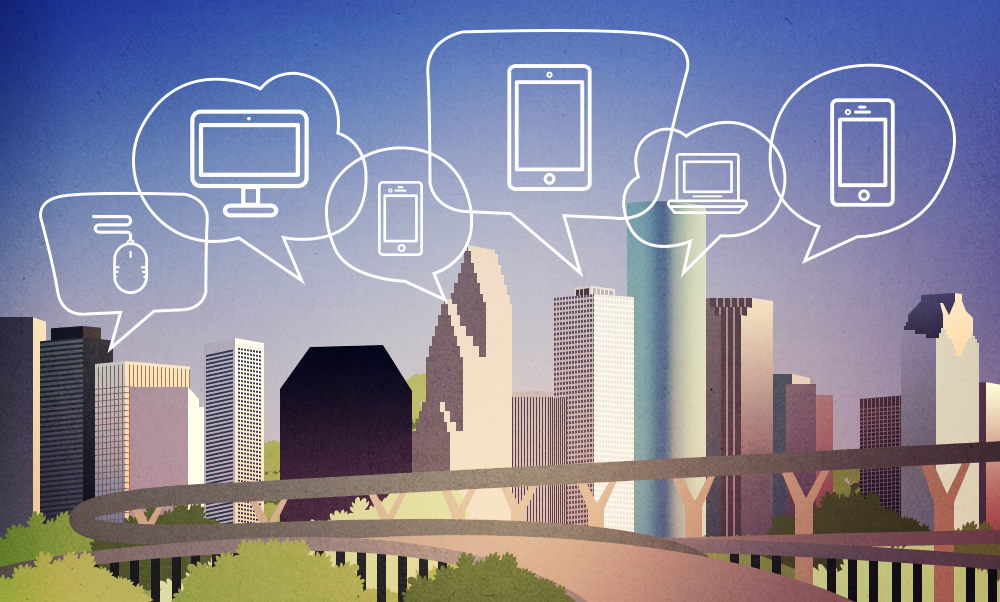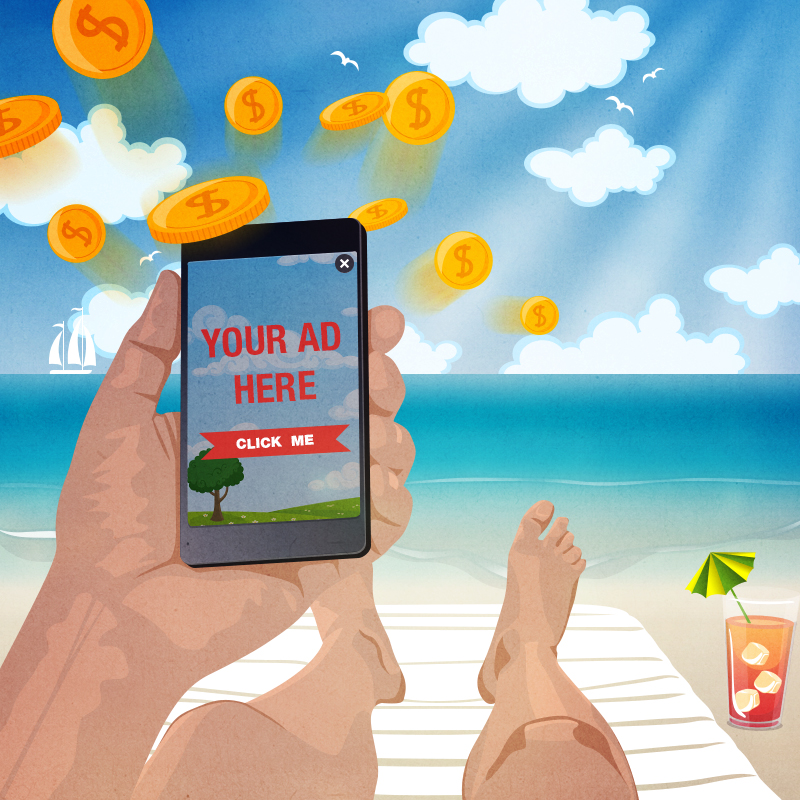Emerging as the next marketing super tool, mobile app use is growing alongside the rapidly developing world of mobile commerce (mCommerce). The average consumer spends 127 minutes in mobile applications a day, responding to emails, browsing Facebook, and searching for places nearby (Streetfight 2013 Hyperlocal). In fact, app usage on mobile devices is overpowering browsing activity with 80% of iOS and Android usage being spent on apps, leaving only 20% on browser activities (Flurry Analytics Comscore).
Hold on to that knowledge for a moment, and let’s look at how important loyal customers are to your business. Customers that have a strong attachment to a brand contribute a 23% premium over the average customer in share of wallet, revenue and profitability (Cap Gemini). Let’s explore how you can capitalize on an engaging mobile app that will help you create those types of customer relationships.
“Customers that have a strong attachment to a brand contribute a 23% premium over the average customer in share of wallet, revenue and profitability.”
Mobile Apps Dominate
Regardless whether you run an online business or a traditional brick-and-mortar store – vendors everywhere are discovering the powerful effect offering buyers a mobile application has on ROI. So you might be thinking to yourself, “Why would I bother with a mobile app? I already have a mobile-optimized site that’s enough, right?” Short answer – no. That’s. Not. Enough.
Let’s clear one thing up first, yes having a mobile-optimized site is extremely important. We will even be so bold to call it imperative. But, and this is a big but – to keep up in the fast-paced competitive mCommerce race, simply having a mobile-friendly site is not going to be enough when your competitors are already reaping the benefits customer loyalty with mobile apps.
Breaking it down, customer engagement is simply better through the use of an app versus mobile site browsing for three very important reasons.
1. Mobile App Speed
A site that takes five or more seconds to load? Ain’t nobody got time for that!

See more on Know Your Meme
Mobile apps are simply much faster to use than a browser app, which is an obvious advantage. That makes it a total game changer when it comes to mobile shopping and other types of mCommerce. Consumers that like to make purchases happen quickly (this especially applies to our topic of customer loyalty, those who return time after time) appreciate the convenience of a fast application that gets the job done quickly.
The importance of speed, literally cannot be understated. Look at the following statistics from eConsultancy:
- 74% of users will abandon a mobile site after waiting five seconds for it to load.
- 57% have experienced problems when accessing a mobile site.
- 46% would not return to a poor performing site.
2. Advanced Functions
You know those little beeps you get all day as your mobile device sends you alerts and notifications from your favorite apps? Your company could become the beep and enter the daily lives of customers with loyalty rewards and other notifications that they’ll love to see.
Notify your customers of last minute deals, scan QR codes, or customize notifications based on customer preference (i.e. when the items they have viewed go on sale or nearly sell out). In fact, according to Rosetta, engaged customers are four times more likely to say they “appreciate when this brand reaches out to me” and seven times more likely to “always respond to this brand’s promotional offers.”
3. Branding Opportunity
Creating a unique branded app icon is an incredibly effective way to imprint your brand into the mind of your customers. Think about how many times a day you browse your own list of apps and how quickly you can identify the app you seek just by its logo. Now, imagine your customers developing that same familiarity with your brand. That’s branding like a boss.
Mobile App Conversion Insight
“The current average conversion rate from mobile apps is between 1-5% depending on your industry, according to Localytics.”
Conversions are always the ultimate goal, right? Mobile apps create lucrative opportunities for companies to improve conversions with the various features, convenience and functionality (taking for granted you are providing your customers a fast, functional and user-friendly app experience).
One of the fears of many businesses is that the investment into the mobile app could be too great or not pay off. Realistically, this is not the case. Let’s say your mobile app cost $5000 and produced 1000 users – this means each new mobile user cost $5. While this is just a quick example, the results aren’t far off from what we have found.
The current average conversion rate from mobile apps is between 1-5% depending on your industry, according to Localytics. While metrics for mobile commerce conversions have been the focus of attention for a while, the new focus will be on actual in-app mobile conversion rates. Compare this to the conversion rates from other marketing channels and you can see the potential ROI. Tempting, isn’t it?
Features
Loyalty rewards
Who doesn’t like to be rewarded? Offering customers incentive to become repeat customers or refer others to your business motivates users to become more active with your business. It’s more than common sense, it’s proven. Take a look at the following statistics:
- 69% of consumers said rewards make them more likely to shop with a brand (Cherry London)
- 93% of consumers think rewards are very important or somewhat important (CrowdTwist)
- Nearly one in three would like brands to send them promotions via mobile device (KO Marketing Associates)
Providing your customers loyalty reward updates, special opportunities to gain more rewards (i.e. earn double rewards on a certain days), and even loyalty reward tracking is easy to do with a mobile application.
Store Mapping
This technology feature is especially useful for retailers that have a very large store. This feature directs customers to the department that is most relevant to the user, i.e. women’s shoes or children’s clothing.
Price Comparison
Provide data and shopping information for your users in a way that is convenient and easy for them. Common features such as price comparisons, advertising average savings, and promoting holiday sales promotions and coupons are effective marketing tactics made easy with mobile apps. It’s no secret that consumers will be comparing prices, so why not do that for them so they don’t leave your app to find this information?
Wish list
Give your website visitors something to get excited about. Building an online wish list or shopping list builds anticipation. Sweeten the deal by sending online alerts when an item on a visitors shopping list goes on sale.
Geolocators
An amazing feature that can be built into your business’ mobile app, geolocators can send special offers and promotions when a customer is within a certain radius of your store or even in your store. Learn more in our mobile advertising blog.
Building Your Overall Marketing Strategy
Creating a knock-out mobile app isn’t the only marketing strategy that deserves your immediate attention, but the potential for ROI suggests you don’t ignore the opportunity. This isn’t something you simply create and you’re done. Understand that a successful mobile app is one that reaches out to its users at every available opportunity in order to improve your product, which in turn increases the likelihood your product will be recommended to others.
“Understand that a successful mobile app is one that reaches out to its users at every available opportunity in order to improve your product.”
Maintaining a current app and providing users with updated features is also a critical component to success. Evaluating what’s working and what’s not, fixing bugs immediately and applying changes based on user feedback are all critical components to a successful mobile app marketing strategy. Need help? Contact us today to learn how we can help you make this is a reality for your business.






Leave A Comment